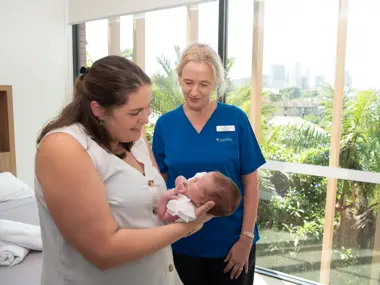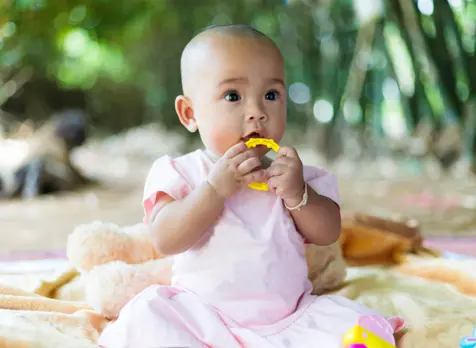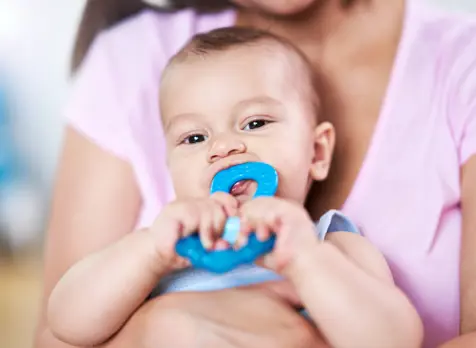Baby Teething

The appearance of growing teeth in your baby is commonly referred to as ‘teething’. Teething is a normal part of your child’s development and starts when the first tooth cuts the gum.
Baby teeth are important and help with speech development, help children to eat and grow, maintain space for adult teeth and are part of a healthy smile.
Teeth usually come through in pairs starting with the bottom front followed by the top two middle and then along the sides and back. Most babies may get their first teeth around 6 months of age but for some children it can be earlier or later than this.
Your baby should have their first 20 teeth by the time they're three years of age.
Average age baby teething charge
| Teeth number | Teeth name | Average age* |
| 1, 2, 3, 4 | Incisors | 6 - 12 months |
| 5, 6 | Baby's first molars | 12 - 20+ months |
| 7, 8 | Canines | 18 - 24 months |
| 9, 10 | Baby's second molars | 24 - 30 months |
*A large range is normal and each child has their own timetable for teething
What are some teething signs and symptoms?
Each baby tooth emerges (‘erupts’) slowly over several weeks or months. They usually come through in pairs starting with the bottom front followed by the top two middle and then along the sides and back.
You may see a lump or an elevation of the gum for several weeks prior to eruption, while sometimes there are no visible signs until the tooth actually appears.
For some babies the arrival of teeth happens without any pain, whilst for other babies teething may cause discomfort. It is important to establish that teething is the problem before administering any treatments.
Often early signs of teething are associated with behaviours like:
- Increased fussiness
- Reduced appetite
- Increased drooling and sucking on toys, dummies or bibs
- More frequent or looser bowel movements
- Tugging on the ear near the side of the erupting tooth.
Sometimes these are teething symptoms in a baby or toddler but often they're also a response to a minor illness or part of a baby's developmental journey. If you're not sure if your baby is unwell, it's best to have a chat with your GP.
How to comfort your baby during teething
-
1
Hugs and cuddles will help comfort and reassure baby if he or she is distressed.
-
2
Give your baby a cool but not frozen teething ring to chew on.
-
3
If your child is uncomfortable while teething you can gently rub their gums with a clean finger or cool wash cloth, remembering to wash your hands first.
-
4
If your baby is over six months, a teething rusk can be useful.
Teething gels and teething (amber bead) necklaces aren’t recommended. Teething gels may not help with the pain and can have harmful side effects. Teething necklaces are a strangulation and choking risk.
How to care for your baby's teeth
When your baby gets teeth, clean them twice a day in the morning and at night with either a clean, thin, damp washer or soft toothbrush with a small head.
To help your baby become more comfortable with the toothbrush, you can let them play with an infant toothbrush while they're in the bath.
The best time to start using toothpaste is when your baby is around 18 months of age, and then only use a very small smear of low fluoride toothpaste.
Most tap water in Australia contains fluoride, so allow and encourage your child to drink tap water from 12months of age (cooled boiled water until 12months of age).
How to prevent decay
When your baby starts solids, offer healthy foods, low in sugar.
If you’re bottle feeding, always take the bottle out of your baby’s mouth as soon as they're finished.
Never prop up a bottle on a cushion or towel to feed your baby. This is not only a choking hazard but it can cause tooth decay.
Bacteria is easily passed on so don’t share utensils or use your mouth to clean spoons or dummies before giving to baby.
Tresillian recommends weaning baby off the dummy altogether around 12 months of age.
FAQs about teething
Babies usually get their first tooth between 6 and 10 months of age.
A teething rash can occur when babies are drooling excessively and it irritates the skin. If you're concerned about your baby's teething rash or you're not sure how to treat it, talk to your GP or local pharmacist.
Fever is usually the body responding to an infection, disease or inflammation. Your child may be experiencing a minor infection or illness while teething, given developmentally this is also a time of exploring the world with their mouth, making them more likely to become unwell. If your child has a fever (>37.5˚C), take their temperature with a thermometer, make them comfortable, offer extra fluids and soft foods, extra cuddles, consider oral paracetamol, and see your GP.
Similar to earlier symptoms, including increased drooling from the mouth, mood changes – increased crankiness, food refusal and depending on language development, they may verbalise a “sore mouth”. Offering cold water-based soft food, such as pieces of cold watermelon or rockmelon, and some outdoor water play activities may help make them feel a little less miserable.
Children will have 20 teeth by the time they're three years of age.






































